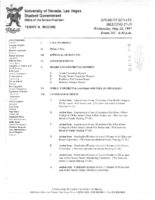Search the Special Collections and Archives Portal
Search Results
Edith Giles Barcus Family Papers
Identifier
Abstract
The Edith Giles Barcus Family Papers document the lives and work of three related individuals who lived in Goldfield, Nevada: noted mining engineer Edwin S. Giles who settled in Goldfield in 1907, his daughter Edith Giles who was raised in Goldfield, and Clyde Barcus, also a mining engineer, who came to Goldfield in 1923 and married Edith Giles soon thereafter. The papers date from 1848 to 1979 and document the business and personal lives of two generations of the Giles-Barcus family in Goldfield and Las Vegas, Nevada. The collection includes: property, commercial, financial, and mining records; mining and engineering reports; notes on minerals; correspondence; and photographs of the family, Goldfield, and travel shots of the western United States.
Archival Collection
UNLV University Libraries Collection of Boulder City, Hoover Dam, and Lake Mead National Recreation Area Maps and Brochures
Identifier
Abstract
The UNLV University Libraries Collection of Boulder City, Hoover Dam, and Lake Mead National Recreation Area Maps and Brochures (1927-1998) primarily contains regional maps, brochures for local points of interest, and subdivision plat maps of Boulder City, Lake Mead, and Hoover (Boulder) Dam.
Archival Collection

Transcript of interview with Mary Kreuzer by Patricia Kohlman, December 15, 1975
Date
Archival Collection
Description
On December 15, 1975, Patricia Kohlman interviewed Mary Kreuzer (born 1923 in Las Vegas, Nevada) in her home in Las Vegas. The two discuss Kreuzer’s childhood, as well as the different addresses that she’s lived at in Las Vegas. The interview concludes with a discussion on entertainment and small businesses before the population boom in Southern Nevada.
Text

Transcript of interview of Thalia Dondero by Mary Germain, March 13, 1976
Date
Archival Collection
Description
On March 13, 1976, Mary Germain interviewed Thalia Dondero (born 1921 in Greeley, Colorado) about her life in Nevada and her experiences as the first female commissioner for the Clark County Commission. Dondero first talks about her upbringing and her eventual move to Southern Nevada. She also discusses her involvement in extracurricular activities, such as being a leader for the Girl Scouts, and how some of those experiences led her to get involved in politics. Dondero also mentions her work with National Geographic and her passion for working with oil paintings and watercolors. The final part of the interview involves some of Dondero’s accounts as a commissioner for Clark County and some of the challenges she has faced in that position.
Text

Transcript of interview with Don Eckert by Robert A. Kamp, March 15, 1981
Date
Archival Collection
Description
On March 15, 1981, Robert A. Kamp interviewed Donald (Don) L. Eckert (born 1953 in Las Vegas, Nevada) about his experiences while living in Nevada. Eckert first explains the geographical boundaries of Las Vegas when he was first born and the types of recreation in which both youth and adults would take part. Eckert then discusses the Helldorado events and how they have changed over the years before describing how the University of Nevada, Las Vegas has changed as well. The interview then shifts to the topic of Eckert’s college major, hotel management, and then to a brief discussion about the MGM fire. Eckert also talks about horse racing in Las Vegas, changes in gaming, the Basic Magnesium plant, and the development of Mount Charleston. The interview concludes with Eckert’s thoughts on the legalization of gambling in other states and how that trend relates to the future of Las Vegas.
Text

Transcript of interview with Bob Campagna by Kathleen Neumann, March 17, 1978
Date
Archival Collection
Description
Text

Transcript of interview with Herbert & Erma Holtam by Marc Hechter, February 7, 1976
Date
Archival Collection
Description
On February 7, 1976, collector, Marc Hechter interviewed Herbert and Erma Holtam in the collector’s home in Las Vegas, Nevada. This interview covers the history of the early Las Vegas Valley area. The discussion includes an in-depth overview of the Helldorado Parade and Helldorado Village. The building of the hotels on the Strip, homesteading, and local housing developments, are also discussed.
Text

Transcript of interview with Linda Hartley by Pauline Marchese, March 10, 1978
Date
Archival Collection
Description
On March 10, 1978, Pauline Marchese interviewed her neighbor, Linda Hartley (born in 1941, in Cedar City, Utah) in her home at 5261 South Jane Way, Las Vegas, Nevada. During the interview, the two discuss Hartley’s personal history, such as schools that she had attended and her recollection of local recreational activities. The two go on to talk about changes in crime, the environment, and briefly discuss a variety of issues at the time, including: segregated schools, prostitution, and effects of the Nevada Test Site.
Text

Meeting minutes for Consolidated Student Senate University of Nevada, Las Vegas, May 28, 1997
Date
Archival Collection
Description
Text

Interview with Wendell D. Weart, April 18, 2006
Date
Archival Collection
Description
Text
